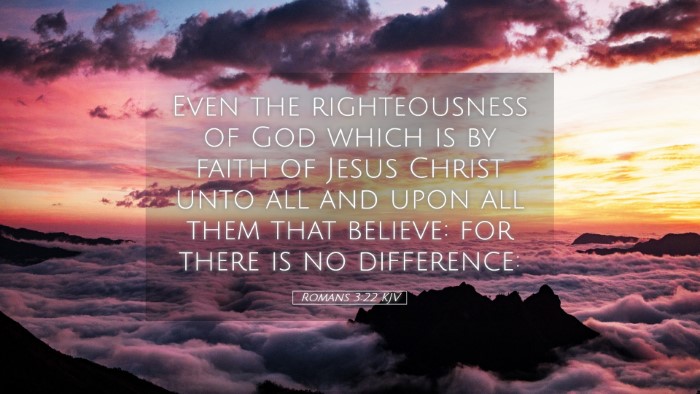Commentary on Romans 3:22
Verse Text: "Even the righteousness of God which is by faith of Jesus Christ unto all and upon all them that believe: for there is no difference." (Romans 3:22, KJV)
Introduction
The verse Romans 3:22 stands at the crux of the Apostle Paul's argument regarding justification and the universal need for salvation through faith in Jesus Christ. It encapsulates the essence of the Christian faith and serves as a pivotal point for understanding the righteousness that comes from God apart from works of the Law. This commentary will explore insights from public domain sources and analyze its theological implications for believers.
The Righteousness of God
Matthew Henry emphasizes that the righteousness spoken of in this verse is not simply a moral quality but a divine attribute that leads to salvation for all who claim Christ by faith. He stresses that God's righteousness is manifested through Jesus Christ and is essential for one's standing before God.
Albert Barnes adds that this righteousness is not tied to the Law's observance but is granted through faith, marking a significant shift from the Jewish understanding of righteousness. He explains that this righteousness is 'of God' and is imputed to the believer, ensuring that faith alone is the means through which one receives this divine gift.
The Role of Faith
Adam Clarke notes that this righteousness is received 'by faith of Jesus Christ', indicating that faith must be directed toward Christ as the object. Clarke asserts that this faith is not merely intellectual assent but an active trust—a reliance on Christ’s redemptive work on the cross.
Henry's commentary further elaborates on faith, suggesting that true faith is transformative; it leads not only to justification but also to a new life characterized by obedience and holiness. Thus, the righteousness of God is not passive; it ignites a believer's journey towards sanctification.
The Universality of Salvation
This verse emphasizes that the righteousness of God is 'unto all' and 'upon all them that believe'. Barnes highlights the radical inclusivity of the Gospel. Salvation is presented as available to all people, regardless of cultural or ethnic divides, erasing distinctions between Jew and Gentile. This universality is a recurring theme in Paul's epistles, reinforcing the notion that all humans are equal before God.
Clarke points out that Paul states, "for there is no difference", affirming that the moral standing of humanity—whether Jew or Gentile—is uniformly condemned due to sin. This reiterates the need for God's righteousness to bridge the gap between humanity and God.
Theological Implications
The implications of Romans 3:22 extend deeply into soteriology, the study of salvation. Henry remarks that this passage provides assurance to believers, revealing that they can rest fully in the righteousness provided through faith. It is a righteousness that relies not on human merit but solely on God's grace and the completed work of Christ.
Barnes also suggests that this righteousness serves as a foundation for Christian moral living. Understanding one's justification through faith compels an individual to live righteously, not as a means of earning favor, but as a response to the grace freely given.
Practical Applications for Believers
- Embrace Faith: Believers are encouraged to deepen their faith in Jesus Christ, recognizing that their standing before God is based on that faith, not on earthly achievements.
- Equality in Christ: Christians are urged to embrace the truth that all are equal at the foot of the cross, promoting unity and peacemaking within the body of Christ.
- Proclaim Righteousness: The charge is to share this message of righteousness through faith, ensuring that others know of the grace offered to all humanity.
Conclusion
Romans 3:22 profoundly contributes to our understanding of salvation, righteousness, and God’s gracious character. The insights drawn from Matthew Henry, Albert Barnes, and Adam Clarke illuminate the text and invite deeper reflection. For pastors, students, theologians, and Bible scholars alike, this verse encapsulates core theological truths that are essential for a robust understanding of the Gospel.


